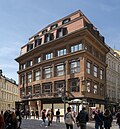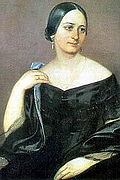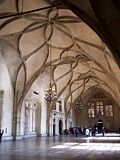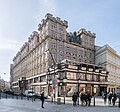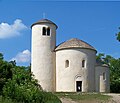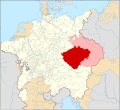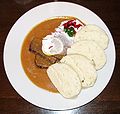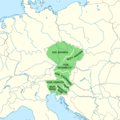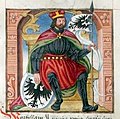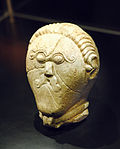Portal:Czech Republic
Welcome to the Czech Portal!
Vítejte na Českém portálu!

|

|

| |
The Czech Republic, also known as Czechia and historically known as Bohemia, is a landlocked country in Central Europe. The country is bordered by Austria to the south, Germany to the west, Poland to the northeast, and Slovakia to the southeast. The Czech Republic has a hilly landscape that covers an area of 78,871 square kilometers (30,452 sq mi) with a mostly temperate continental and oceanic climate. The capital and largest city is Prague; other major cities and urban areas include Brno, Ostrava, Plzeň and Liberec.
The Duchy of Bohemia was founded in the late 9th century under Great Moravia. It was formally recognized as an Imperial Estate of the Holy Roman Empire in 1002 and became a kingdom in 1198. Following the Battle of Mohács in 1526, all of the Lands of the Bohemian Crown were gradually integrated into the Habsburg monarchy. Nearly a hundred years later, the Protestant Bohemian Revolt led to the Thirty Years' War. After the Battle of White Mountain, the Habsburgs consolidated their rule. With the dissolution of the Holy Roman Empire in 1806, the Crown lands became part of the Austrian Empire.
During the 19th century, the Czech lands underwent significant industrialization. Following the collapse of Austria-Hungary after World War I, most of the region became part of the First Czechoslovak Republic in 1918. Czechoslovakia was the only country in Central and Eastern Europe to remain a parliamentary democracy during the entirety of the interwar period. After the Munich Agreement in 1938, Nazi Germany systematically took control over the Czech lands. Czechoslovakia was restored in 1945 and three years later became an Eastern Bloc communist state following a coup d'état in 1948. Attempts to liberalize the government and economy were suppressed by a Soviet-led invasion of the country during the Prague Spring in 1968. In November 1989, the Velvet Revolution ended communist rule in the country and restored democracy. On 31 December 1992, Czechoslovakia was peacefully dissolved, with its constituent states becoming the independent states of the Czech Republic and Slovakia.
The Czech Republic is a unitary parliamentary republic and developed country with an advanced, high-income social market economy. It is a welfare state with a European social model, universal health care and free-tuition university education. It ranks 32nd in the Human Development Index. The Czech Republic is a member of the United Nations, NATO, the European Union, the OECD, the OSCE, the Council of Europe and the Visegrád Group. (Full article...)
Selected article -

Gun laws in the Czech Republic adhere to the European Firearms Directive. Legal accessibility is comparable to those EU and EFTA countries which consider firearms to be primarily tools of individual or collective safety (i.e. Switzerland, Austria, Poland, Baltic states, Finland) and not just sporting instruments (see Gun laws in the European Union).
Right to keep and bear arms is considered to be an attribute of liberty in the country. It is explicitly recognized in the first Article of the Firearms Act. At the constitutional level, the Charter of Fundamental Rights and Freedoms protects the "right to defend one's own life or life of another person also with arms under conditions stipulated by law". (Full article...)
Selected picture

Photographer: Multimotyl; License: Dual (GNU Free Documentation License and Creative Commons CC-BY-SA)
In this month
- 1 July 1991 – The Warsaw Pact is dissolved in Prague
- 6 July 1415 – Church reformer Jan Hus is burned at the stake, marked by a state holiday since 1925.
- 9 July 1357 – Charles IV reportedly lays the first stone at the Charles Bridge (pictured) in Prague
- 29 July 1817 – Foundation of Moravské zemské muzeum in Brno under the name Františkovo muzeum, the second-oldest museum in the country
- 30 July 1419 – The first of the Defenestrations of Prague: a group led by priest Jan Želivský go to Prague's New Town Hall, where they throw councillors out of the windows, starting the Hussite Wars
Categories
Selected biography -

Gustav Mahler (German: [ˈɡʊstaf ˈmaːlɐ] ⓘ; 7 July 1860 – 18 May 1911) was an Austro-Bohemian Romantic composer, and one of the leading conductors of his generation. As a composer he acted as a bridge between the 19th-century Austro-German tradition and the modernism of the early 20th century. While in his lifetime his status as a conductor was established beyond question, his own music gained wide popularity only after periods of relative neglect, which included a ban on its performance in much of Europe during the Nazi era. After 1945 his compositions were rediscovered by a new generation of listeners; Mahler then became one of the most frequently performed and recorded of all composers, a position he has sustained into the 21st century.
Born in Bohemia (then part of the Austrian Empire) to Jewish parents of humble origins, the German-speaking Mahler displayed his musical gifts at an early age. After graduating from the Vienna Conservatory in 1878, he held a succession of conducting posts of rising importance in the opera houses of Europe, culminating in his appointment in 1897 as director of the Vienna Court Opera (Hofoper). During his ten years in Vienna, Mahler—who had converted to Catholicism to secure the post—experienced regular opposition and hostility from the anti-Semitic press. Nevertheless, his innovative productions and insistence on the highest performance standards ensured his reputation as one of the greatest of opera conductors, particularly as an interpreter of the stage works of Wagner, Mozart, and Tchaikovsky. Late in his life he was briefly director of New York's Metropolitan Opera and the New York Philharmonic. (Full article...)
Did you know?

- ... that in 2005 UNESCO proclaimed the Moravian male recruit dance verbuňk as part of the Intangible Cultural Heritage of Mankind?
- ... that in 2013, the Czech Republic plans to directly elect its president for the first time in its history?
- ... that, having played 465 league matches, Jaroslav Šilhavý holds the record for the most appearances in top-flight Czech football?
- ... that Czech Karel Robětín was not only an Olympian and national tennis champion but also an international paper industry tycoon?
General images
Related portals
Topics

Czech lands: Bohemia • Moravia • Czech Silesia
History: Únětice culture • Boii • Marcomanni • Samo • Great Moravia • Přemyslid dynasty • Lands of the Bohemian Crown • Czech lands (1526–1648) • 1648–1867 • 1867–1918) • Czechoslovakia • Czech Republic
Geography: Lakes • Protected areas • Regions • Rivers
Law: Judiciary • Law enforcement • Supreme Court of the Czech Republic
Politics: Administrative divisions • Government • Constitution • Elections • Foreign relations • Army • Parliament • Political parties • President • Prime Minister
Economy: Banks • Czech koruna • Energy • Oil and gas deposits • Stock Exchange • Tourism • Transport
Culture: Architecture • Art • Cinema • Cuisine • Demographics • Education • Language • Literature • Media • Music • Philosophy • Prostitution • Public holidays • Religion • Sport • Television • Video games
Symbols: Flag • Coat of arms • National anthem (Kde domov můj)
Lists: Outline of the Czech Republic • List of Czech Republic–related topics
WikiProjects
Featured and good content
Things to do
Wikimedia
The following Wikimedia Foundation sister projects provide more on this subject:
-
Commons
Free media repository -
Wikibooks
Free textbooks and manuals -
Wikidata
Free knowledge base -
Wikinews
Free-content news -
Wikiquote
Collection of quotations -
Wikisource
Free-content library -
Wikiversity
Free learning tools -
Wikivoyage
Free travel guide -
Wiktionary
Dictionary and thesaurus













